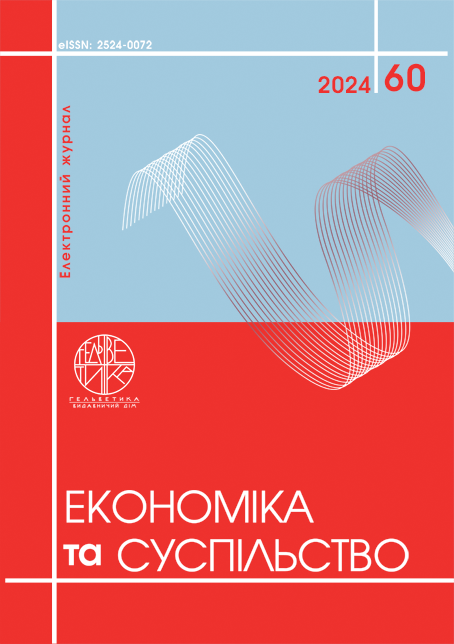ORGANIZATIONAL ASPECTS OF THE MARKETING STRATEGY FORMATION PROCESS IN TODAY'S CONDITIONS
Abstract
The peculiarities of the organization of the process of forming the company's marketing strategy on a planned basis as a process of management activity are researched in the article. The purpose of this study is to detail and specify the methodology of implementing the organizational process in the formation of the marketing strategy of the enterprise based on foreign experience. It was determined that the formation of the marketing strategy should be carried out by the executors on a planned basis. That is, it is proposed to develop and implement a marketing strategy formation plan. Therefore, the chosen topic is relevant in today's conditions. After all, the methods of marketing strategy formation proposed by domestic scientists are limited to recommendations regarding the structure of the content of the marketing strategy. The proposed approach to the formation of the enterprise's marketing strategy involves: definition of performers; development of a work plan for strategy formation; drawing up calendar schedules of works. The study suggests the creation of planning committees, which should involve: customers, representatives of interested organizations and experts in the field of marketing planning. The study offers scientifically based approaches to the formation of monitoring procedures, definition of criteria and procedures for the final assessment of the effectiveness of the strategy and reporting. Emphasis is placed on the fact that marketing planning should have a cyclical nature, that is, the results of the analysis of the effectiveness of the previous marketing strategy should be the basis for the formation of the company's marketing strategy for the next planning period. The study also notes that depending on the specifics of the company's activity, it may be appropriate to involve volunteers in the process of forming a marketing strategy. The practical value of the conducted research lies in the fact that the approach to the formation of a marketing strategy proposed in the article saves the company's time and resources, allows to more effectively organize the process of its formation and, ultimately, improves the quality and effectiveness of the formed strategy. The positive effect of the practical application of the proposed methodology is especially important for enterprises in modern conditions of martial law, uncertainty and variability of the market environment.
References
Буняк Н.М. Сутність маркетингової стратегії підприємства. Вісник Волинського інституту економіки та менеджменту. 2019. Вип. 23. С. 22–29.
Карпенко Н.В. Маркетингова діяльність підприємств: сучасний зміст: монографія. Київ: Центр учбової літератури, 2020. 251 с.
Левченко К.А. Маркетингова стратегія підприємства на ринку промислових товарів України: порядок формування та стратегічні ризики. Економіка та держава. 2018. № 3. С. 113–117.
Монастирський Г.Л. Теорія організації: підручник. Тернопіль: «Крок», 2019. 368 с.
Скібіцька Л.І. Організація праці менеджера: навч. посіб. Київ: Центр учбової літератури, 2010. 360 с.
Менькова К.І., Зозульов О.В. Структурно‐логічна схема реалізації методу маркетингового стрес‐тестування бізнес моделі підприємства. Економічний вісник Національного технічного університету України «Київський політехнічний інститут». 2020. №17. С.330–339.
Conklin, N., and Spiegel, M. (1992) A systems approach to program development and evaluation. Unpublished manuscript. Columbus, OH: Ohio State University Extension.
Boyle, P. (1981) Planning better programs. New York, NY: McGraw-Hill.
Mayeske, G. (1994) Life cycle program management and evaluation: an heuristic approach. Part 1. Washington, D.C.: Extension Service, USDA.
Witkin, B., and Altschuld, J. R. (1995) Planning and conducting needs assessments, a practical guide. London, England: Sage Publications.
Boone, E. J.; Pettit, J., and Safrit, R.D. (1994) Program evaluation in Extension. Journal of Extension Systems, no. 10 (1), pp. 87–121.
Murphy, J., and Marchant, T. J. (1988) Monitoring and evaluation in Extension agencies. Washington, D.C.: The World Bank.
Buniak N.M. (2019). Sutnist marketynhovoi stratehii pidpryiemstva [The essence of marketing strategy of the enterprise]. Visnyk Volynskoho instytutu ekonomiky ta menedzhmentu, vol. 23, рp. 22–29.
Karpenko N.V. (2020). Marketynhova diialnist pidpryiemstv: suchasnyi zmist: monohrafiia [Marketing activity of enterprises: modern content: monograph]. Kyiv: Tsentr uchbovoi literatury, 251 p.
Levchenko K.A. (2018). Marketynhova stratehiia pidpryiemstva na rynku promyslovykh tovariv Ukrainy: poriadok formuvannia ta stratehichni ryzyky [Marketing strategies of the enterprise on the industrial market of Ukraine: formation procedure and strategic risks]. Ekonomika ta derzhava, no. 3, pp. 113–117.
Monastyrskyi H.L. (2019). Teoriia orhanizatsii: pidruchnyk [Theory of organization: a textbook]. Ternopil: «Krok», 368 p.
Skibitska L.I. (2010). Orhanizatsiia pratsi menedzhera: navch. posib [Manager's work organization: a study guide]. Kyiv: Tsentr uchbovoi literatury, 360 p.
Menkova K.I., Zozulov O.V. (2020). Strukturno‐lohichna skhema realizatsii metodu marketynhovoho stres‐testuvannia biznes modeli pidpryiemstva [Structural and logical frame for conducting method of marketing stress testing of the enterprise’ business model]. Ekonomichnyi visnyk Natsionalnoho tekhnichnoho universytetu Ukrainy «Kyivskyi politekhnichnyi instytut», no.17, pp. 330–339.
Conklin, N., and Spiegel, M. (1992). A systems approach to program development and evaluation. Unpublished manuscript. Columbus, OH: Ohio State University Extension.
Boyle, P. (1981). Planning better programs. New York, NY: McGraw-Hill.
Mayeske, G. (1994). Life cycle program management and evaluation: an heuristic approach. Part 1. Washington, D.C.: Extension Service, USDA.
Witkin, B., and Altschuld, J. R. (1995). Planning and conducting needs assessments, a practical guide. London, England: Sage Publications.
Boone, E. J.; Pettit, J., and Safrit, R.D. (1994). Program evaluation in Extension. Journal of Extension Systems 10 (1): 87-121.
Murphy, J., and Marchant, T. J. (1988). Monitoring and evaluation in Extension agencies. Washington, D.C.: The World Bank.

This work is licensed under a Creative Commons Attribution 4.0 International License.


